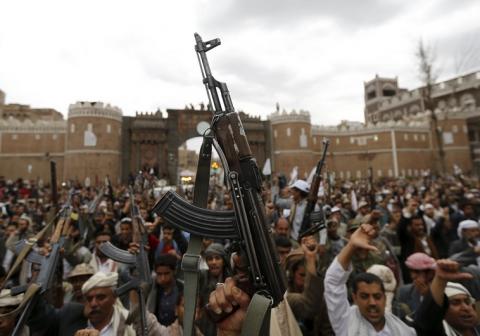U.N. Human Rights Chief Calls for Independent Inquiry on Yemen


GENEVA — The United Nations human rights chief called on Monday for an independent inquiry into violations in Yemen by the Saudi-led coalition and by the Houthi rebels the coalition is fighting.
More than 2,000 civilians have been killed and 4,000 wounded in the Yemen conflict, and the United Nations official, Zeid Ra’ad al-Hussein, told the Human Rights Council in Geneva that the fighting had left 21 million people, or 80 percent of the population, in need of humanitarian aid.
Mr. al-Hussein’s statement opened a monthlong session of the council, which will hear reports on a number of crises, including in Syria and in Ukraine, and a long-awaited one on investigations into mass killings of civilians in Sri Lanka at the end of its civil war and later.
After a year as the United Nations high commissioner for human rights, Mr. al-Hussein said he and many colleagues felt exhausted and angry at the overwhelming scale of humanitarian crises, singling out “the utterly shameful example” of the international community’s failure to address the conflict in Syria.
His account of the deepening crisis in Yemen echoed the findings of a report he released on Friday, which provided details about airstrikes by the Saudi-led coalition and about the shelling of civilian targets by the Houthis and their affiliated forces, among other violations, that it said might amount to war crimes.
Coalition airstrikes killed at least 941 civilians and injured 2,295 in May, June and July, according to the report. The air campaign, in conjunction with a naval blockade the coalition has imposed on Yemen’s main ports, had “dramatically worsened” the country’s humanitarian crisis, the report said.
Forces affiliated with Houthi rebels had attacked schools and mosques, the report said, giving details about an artillery attack on a cement factory that had killed at least 20 employees, one of a number of cases involving the shelling of civilian areas and sniper attacks.
Mr. al-Hussein welcomed plans announced last week by President Abdu Rabbu Mansour Hadi, who has been forced into exile, to investigate violations. International human rights organizations, however, have expressed doubt about whether a government in exile, dependent on the support of the Saudi-led forces that have been implicated, can conduct an impartial inquiry.
The report on Yemen released by Mr. al-Hussein on Friday also acknowledged those concerns, encouraging states to support the creation of an international inquiry mechanism, and there appeared to be some diplomatic support for such an initiative.
The Dutch foreign minister, Bert Koenders, said last month that his government was looking at the possibility of introducing a resolution in the council calling for an international investigation. Discussions on the possible form and mandate of such an inquiry are already underway on the sidelines of the council meeting.
NY Times

Paris — The French humanitarian organization Acted announced that it has delivered cash assistance to nearly 89,000 people affected by displa…

Sana’a — Fuel and food imports into ports under the control of Yemen’s Houthi movement on the Red Sea have continued to fall for…

ADEN — Yemen Airways, the country’s national carrier, announced it will resume flights between Aden and Abu Dhabi beginning in January…